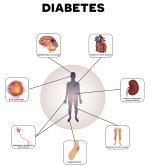Causes of Diabetes

Scientific research into diabetes mellitus is increasing all the time. Despite this, no one actually knows what specifically causes diabetes. This has led to a number of rumors circulating, some which are partially true and others which hold no truth at all. In this piece, we will be discussing what is known about the causes of diabetes mellitus.
General Causes
We know that diabetes mellitus develops as a result of the body's cells not getting enough insulin (a hormone which helps convert blood sugar into energy). This is usually due to the fact that the pancreas fails to generate enough insulin or because the body's cells start to resist the insulin produced. Although we know what leads to the development of diabetes mellitus we do not currently know exactly why this happens in certain individuals and not others.
Type I Diabetes
Type 1 diabetes mellitus is normally caused by damage to the pancreas due to an auto-immune attack where the body's immune system starts to attack the insulin-producing beta cells of the pancreas. While we know what causes type 1 diabetes, what TRIGGERS this response is still not clear. A number of suggestions and theories have been put forward (including vaccines, faulty nerves and viral infection) but currently, none of these suggestions and theories can be applied universally.
Type II And Pre-Diabetes
Pre-diabetes is an early form of type II diabetes mellitus and the causes of each are quite similar. Type II diabetes mellitus develops when the body system stops responding to insulin. The pancreas responds by producing more insulin and the liver reacts by releasing extra glucose.
Over time this limits the effectiveness of the pancreas and further increases insulin resistance in the body system. As with the other types of diabetes mellitus, there is no universal consensus on what causes the above reaction. However, there is very strong evidence that type 2 diabetes is linked to a high carbohydrate diet, ethnicity, history, family, age, inactivity, and obesity.
Gestational Diabetes
Again, there is no universal consensus on what causes of Gestational Diabetes although it is strongly linked to hormonal changes and fluctuations that occur during the second and third trimesters of pregnancy. During this period the placenta releases hormones which block the normal action of insulin to ensure that the growing fetus gets enough glucose.
This causes pregnant women's insulin needs to significantly increase by two or three times the normal rate. Failure to meet this need leads to the onset of Gestational Diabetes Mellitus. Approximately 7% of pregnant women develop Gestational Diabetes Mellitus and although we have a good idea of what causes it, there is still no general consensus on why it affects some women and
not others. There are a number of associated risk factors, including weight and a diet high in simple carbohydrates, but currently no definitive reason.
What the American Diabetes Association Would Have You Believe
The exact cause of diabetes mellitus is unknown and there are a number of false suggestions floating around. These include diabetes mellitus being contagious (there is a hereditary element to diabetes but it cannot be passed directly or physically from person to person), diabetes mellitus being caused by sugar (excessive sugar consumption does not cause diabetes mellitus but is linked with obesity, a diabetes risk factor) and stress causing diabetes (stress can aggravate the condition in diabetics but there is currently no evidence that it is the main cause diabetes).
Currently, we have a general understanding of what happens inside our bodies to cause diabetes mellitus. However, the trigger behind these causes is still up for debate. Perhaps the strongest link is between inactivity, obesity and type II diabetes but even these does not fully explain why some obese individuals never develop this disease.
As scientific research into the causes of diabetes mellitus continues, the best advice is to try and keep your blood glucose levels within a normal range. Keeping your weight under control, exercising regularly and eating a healthy and balanced diet can all play their part in this process.
What the Scientific Studies are Telling Us
When you look at the science, you see a completely different picture when it comes to what causes type 2 diabetes in particular.
Diabetes IS caused by excessive sugar consumption as well as excessive carbohydrate consumption. Both of which cause high, uncontrolled blood sugar levels and over time, insulin resistance and beta cell burnout.
Dr. Robert Lustig a professor of Clinical Pediatrics in the Division of Endocrinology at the University of California says that your body can safely metabolize six teaspoons of added sugar per day and that fructose in the form of high fructose corn syrup is just as damaging as table sugar when it comes to developing insulin resistance.
Stress DOES cause diabetes. The adrenal glands regulate both stress and blood sugar levels. When the adrenal glands become overwhelmed, their ability to do their part in blood sugar regulation diminishes. It is common for people with adrenal insufficiency (adrenal fatigue) to have unregulated blood sugar levels and to develop both insulin resistance and type 2 diabetes.
Controlling diabetes is possible when patients are given correct dietary advice. The evidence for the use of a low -carbohydrate and ketogenic diets to treat diabetes continues to mount, but still the American Diabetes Association refuses to change their dietary guidelines to reduce the amount of carbohydrate intake that diabetics are told to maintain.
This recent study by Feinman et al. titled “Dietary carbohydrate restriction as the first approach in diabetes management: Critical review and evidence base” discusses 12 points of strong evidence on why a low carbohydrate, ketogenic diet is THE BEST treatment for controlling diabetes.
Here are some highlights from the Study:
• The study presents major evidence for low-carbohydrate diets as first approach for diabetes.
• Low Carbohydrate diets reliably reduce high blood glucose, the most salient feature of diabetes.
• Benefits do not require weight loss although nothing is better for weight reduction.
• Carbohydrate-restricted diets reduce or eliminate need for medication.
• There are no side effects comparable with those seen in intensive pharmacologic treatment.
The findings I honestly don't know how anyone in their right mind could doubt the evidence after reading this paper. If you are in doubt, please see the list of over 20 scientific studies on this topic listed in the Low Carb and Ketogenic Diets for Lowering Blood Sugar Section of our References page.
If low carbohydrate diets reverse the symptoms of diabetes, could it be that consuming a diet that it high in carbohydrates and sugar might be one of the causes of diabetes? Seems pretty obvious, doesn’t? Combine that with the fact that most Americans now eat 150 pounds of sugar per year. This is an astronomical amount and a huge increase over what we ate just 100 years ago. In the 1700’s average sugar consumption for an Englishman was just 4 pounds per year.
A simple search on Brainly.com returns the following two answers for the question “What is the leading cause of type 2 diabetes”:
• The leading causes of type 2 diabetes generally is and always will be improper diet and exercise.
• Genetics and an unhealthy lifestyle (does not exercise, eats poorly, obesity)
So it seems like the answer is obvious to many people who do not have advertising or investors with money riding on selling more diabetic medications.
Conclusion
While we know for sure that a western diet that is high in carbohydrates and low in healthy fats is a big contributor in developing type II diabetes, we still have a long way to go when it comes to determining all of the causes of diabetes. Wouldn’t it be nice to know how genetically modified organisms (GMO’s), pesticide usage and artificial flavorings in our food may (or may not) contribute to type 1 & 2diabetes?
What about the effects of vaccines on type I diabetes rates? We know that vaccines hyper excite the immune system and have been correlated with autoimmune diseases. Wouldn’t it be nice to know if certain vaccines were more likely to cause your own immune system to destroy your pancreas?
Unfortunately, the main roadblock to getting definitive answers is that the people who control the money to run these kinds of studies have a vested interest in NOT conducting them.



New! Facebook Comments
What do you think? Share your thoughts below...